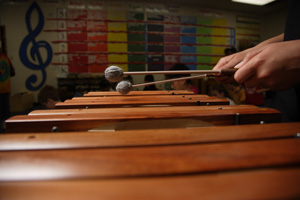Why does my xylophone sound:
a. so soft?
b. so loud?
c. delicate when I want a bold sound?
d. cutting when I want a tranquil sound?
 Very likely the answer lies with the mallets you are using for that particular instrument.
Very likely the answer lies with the mallets you are using for that particular instrument.
Mallets for classroom instruments are available with wood, plastic, rubber, felt, cord-wound, and yarn-wrapped heads. Each instrument comes with a pair of mallets that the manufacturer recommends, but over the years these mallets may have become separated from the instrument, or have been replaced by a different model or brand of mallet. You may come to a new school to find a wealth of barred instruments, but with a collection of mallets that is either not organized, or is completely worn out, and in need of replacement. You may want your ensemble to sound bright and lively for Zimbabwean marimba music, but hushed and haunting to accompany a modal Scottish ballad.
Ensemble timbre can be modified by the orchestration of the piece, the playing style and individual technique. But you can also regulate how each instrument will sound by the mallets you choose.
Here are some basic guidelines:
1. If the instrument is not speaking clearly throughout its range, choose a harder mallet.
2. If the instrument sounds harsh or brittle, choose a softer mallet.
3. With wood, rubber and plastic mallets you will hear the attack of the mallet as well as the resonance of the bar.
4. With felt, cord-wound, and yarn wrapped mallets you will hear very little if any attack. This produces a warmer sound.
5. Be sure your bars are well insulated from the resonator box with appropriate tubing and nail sheathing before you make your final judgment about mallets. Bars sitting on wood, or buzzing against metal nails will not display their full resonance.
You may contact me anytime for help on choosing mallets, or to determine if your barred instruments have other issues which may be inhibiting them from sounding terrific.





 Very likely the answer lies with the mallets you are using for that particular instrument.
Very likely the answer lies with the mallets you are using for that particular instrument. 
